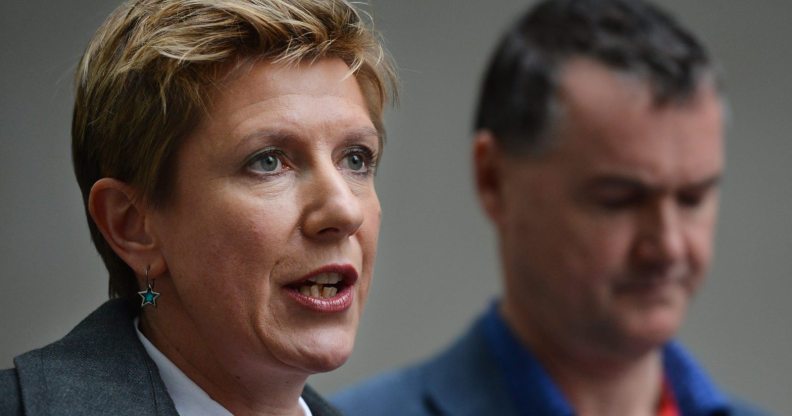Liz MacKean, the journalist behind groundbreaking gay Russian documentary dies at 52

BBC Newsnight journalist Liz Mackean (L) talks next to colleague Meirion Jones (R) as the pair make statements to the media at BBC Broadcasting House in London on December 19, 2012 after the release of the Pollard report into BBC’s handling of the child-sex abuse claims against late presenter Jimmy Savile. The report strongly criticised the BBC’s handling of allegations of child sex abuse against Savile but cleared the corporation of a cover-up. The report sparked the resignation of the BBC’s deputy director of news, Stephen Mitchell, and led to the editor and deputy editor of the current affairs programme Newsnight at the centre of the scandal being replaced. AFP PHOTO / BEN STANSALL (Photo credit should read BEN STANSALL/AFP/Getty Images)
BBC Newsnight journalist Liz Mackean (L) talks next to colleague Meirion Jones (R) as the pair make statements to the media at BBC Broadcasting House in London on December 19, 2012 after the release of the Pollard report into BBC's handling of the child-sex abuse claims against late presenter Jimmy Savile. The report strongly criticised the BBC's handling of allegations of child sex abuse against Savile but cleared the corporation of a cover-up. The report sparked the resignation of the BBC's deputy director of news, Stephen Mitchell, and led to the editor and deputy editor of the current affairs programme Newsnight at the centre of the scandal being replaced. AFP PHOTO / BEN STANSALL (Photo credit should read BEN STANSALL/AFP/Getty Images)
Leading journalist Liz MacKean, who was behind a groundbreaking documentary revealing anti-gay groups in Russia, has died.
MacKean, who started her career at the BBC before going to Channel 4, died this week at 52 after suffering a stroke.
Channel 4’s harrowing 2014 documentary, Hunted, followed the Russian gangs that hunt gay men for sport.
MacKean got inside the St Petersburg branch of Occupy Paedophilia, an anti-gay organisation with at least 37 chapters across Russia. The group tracked down and abducted gay men, torturing and humiliating them, before posting the footage on the internet.

Despite some low-tech harassment outside a gay film festival, the vigilantes weren’t afraid of using technology to hunt their prey – they used gay dating websites for what they call ‘safaris’, attempting to lure gay men to a flat where they wait in ambush.
Most of the group in the documentary didn’t seem concerned to hide their identities, unworried that their actions might have repercussions.
MacKean told PinkNews that they enjoyed huge public support in Russia, and “genuinely think they’re doing right.”
James Harding, the BBC’s director of news paid tribute to MacKean, had a reputation as a “remarkably tenacious and resourceful reporter”.
“In Northern Ireland, she won the trust of all sides and produced some of the most insightful and hard-hitting reporting of the conflict,” he added.
“It was as an investigative reporter that she really shone, shining a light on issues from the dumping of toxic waste off the African coast to Jimmy Savile, the story for which she is probably best known.”
In the film, showing off for the camera, the group find a man looking for a hookup, and lure him back to the flat. He is caught and held down, as the group set about extracting a confession from him. “We will ruin his life, as usual”, one quips.
The group humiliate the man, coercing him into an ‘interview’ about his sexuality, and forcing him to dance. Compared to some of the other victims of the vigilante groups, he is lucky; being beaten and drenched in urine is the standard humiliation, but some of the assaults have been much, much worse.
Another man, Dima, was left blinded in one eye after an attack by an anti-gay group. He says he can almost understand why the groups target gay men, as the country’s anti-gay propaganda law silences anyone who speaks positively or neutrally about gay rights: “First they stopped us responding, and then they called us paedophiles and rapists.”
Across town a lesbian couple, Yulia and Svette, live in constant fear that they will be targeted, or that their three children from previous marriages will be taken away from them under the propaganda law. They are tired of hiding their relationship, but make clear they will fight to keep their children. “They’d have to shoot me first,” Yulia says.
MacKean agreed that the constant negative reinforcement that gay people are paedophiles is making things worse, and is held up by an ‘unholy alliance’ of President Putin and the ultra-conservative Russian Orthodox Church.
She said: “The fact that just 1% of the gay population dares to live openly shows how bad the problem is.”
“Most Russians don’t knowingly know anyone who’s gay, and so for them the old prejudice, the connection with paedophilia and homosexuals, there’s nothing to break that up.”
Before going to work on Channel 4’s dispatches, MacKean worked at the BBC in Hereford and Worcester.
She later reported from Scotland and Northern Ireland.
The mother of two took voluntary redundancy from the BBC in 2013.
She is survived by her wife and two children.

